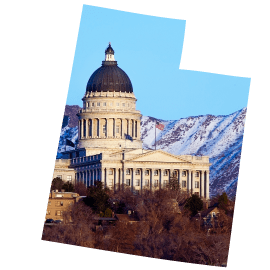Secondary Teacher Preparation: Utah
Delivering Well Prepared Teachers Policy
Analysis of Utah's policies
Utah requires that its secondary teacher candidates pass a Praxis II content test to teach any core secondary subjects. Unfortunately, Utah permits a significant loophole to its policy by allowing both combination science and general social studies licenses, without requiring subject-matter testing for each subject area within these disciplines (see Goals 1-G and 1-H).
Further, to add an additional field to a secondary license, teachers must also pass a Praxis II content test. However, as stated above, Utah cannot guarantee content knowledge in each specific subject for those secondary teachers who add general science or general social studies endorsements.
Recommendations for Utah
Require subject-matter testing for secondary teacher candidates.
Utah wisely requires subject-matter tests for most secondary teachers but should address any loopholes that undermine this policy (see Goals 1-G and 1-H). This applies to the addition of endorsements as well.
State response to our analysis
Utah was helpful in providing NCTQ with the facts necessary for this analysis.
Select another topic
Delivering Well Prepared Teachers
- Admission into Preparation Programs
- Elementary Teacher Preparation
- Elementary Teacher Preparation in Reading Instruction
- Elementary Teacher Preparation in Mathematics
- Middle School Teacher Preparation
- Secondary Teacher Preparation
- Secondary Teacher Preparation in Science
- Secondary Teacher Preparation in Social Studies
- Special Education Teacher Preparation
- Assessing Professional Knowledge
- Student Teaching
- Teacher Preparation Program Accountability
Expanding the Pool of Teachers
Identifying Effective Teachers
- State Data Systems
- Evaluation of Effectiveness
- Frequency of Evaluations
- Tenure
- Licensure Advancement
- Equitable Distribution
Retaining Effective Teachers
Exiting Ineffective Teachers
Research rationale
Research studies have demonstrated the positive impact of teacher content knowledge on student achievement. For example, see D. Goldhaber, "Everyone's Doing It, But What Does Teacher Testing Tell Us About Teacher Effectiveness?" Journal of Human Resources, vol. XLII no.4 (2007). See also Harris, D., and Sass, T., "Teacher Training, Teacher Quality and Student Achievement." Teacher Quality Research (2007).Evidence can also be found in White, Pressely, DeAngelis "Leveling up: Narrowing the teacher academic capital gap in Illinois" Illinois Education Research Council (2008); D. Goldhaber and D. Brewer, "Does teacher certification matter? High School Certification Status and Student Achievement." Educational Evaluation and Policy Analysis. 22: 129-145. (2000); and D. Goldhaber and D. Brewer, "Why Don't Schools and Teachers Seem to Matter? Assessing the impact of Unobservables on Educational Productivity." Journal of Human Resources (1998).

